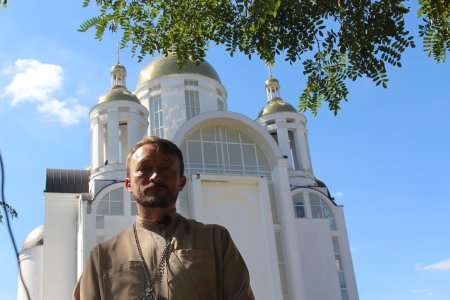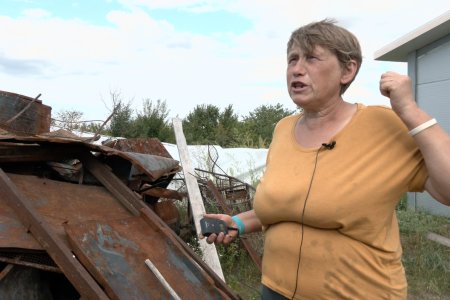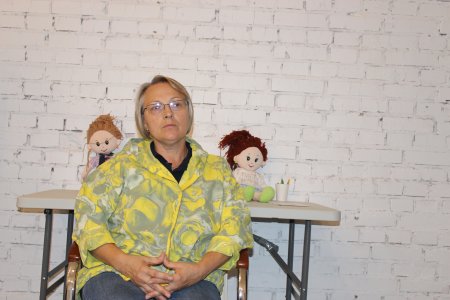My husband and I lived in Horenka (Kyiv Region). We moved in October 2019, bought a flat and were very happy that it was not far from Kyiv. The air in Horenka is very clean. We have no children together, but Ihor (the husband) has three grown-up children and I have a son from my previous marriage. All the children are grown up. They live separately, and when Ihor and I bought a flat, they were very happy for us.
We both worked in Kyiv. We both had private businesses and were managers of our own companies. My company makes logos on souvenirs. Ihor’s company makes leather goods.
On February 24 we were awakened by a phone call. It was our son-in-law. He just said to my husband: “Ihor Olehovich, wake up, the war has begun”.
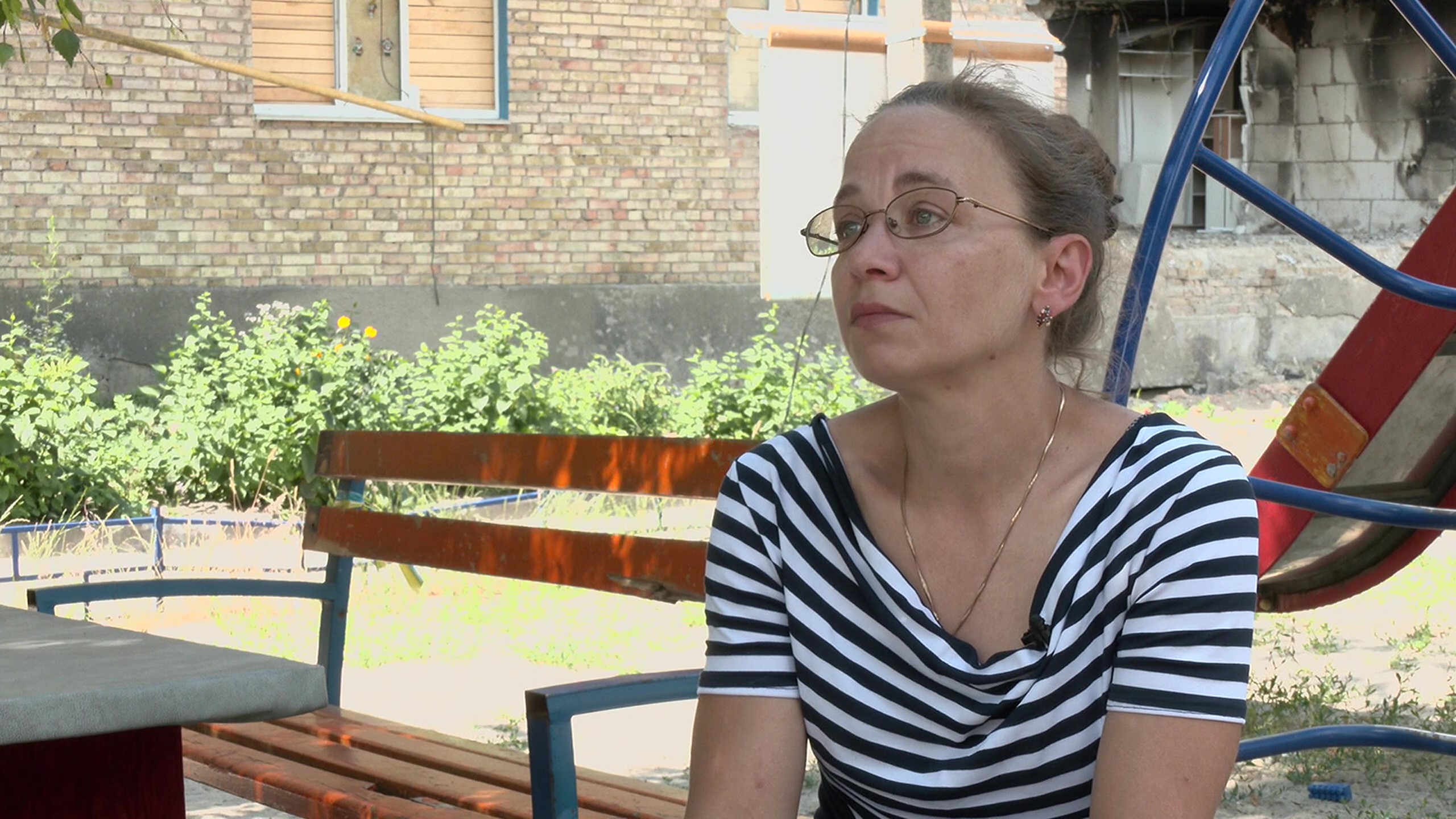
Doubts and hasty packing
Later Hostomel airport was bombed. The first three enemy helicopters were shot down. Everything was happening before our eyes. To be honest, even then I didn’t realise that the situation was serious. I just fried meatballs for dinner because my husband was hungry. Then, around 17:00, I went for a walk with our two dogs. And all day long we hesitated — should we leave or not? We packed some clothes and medicine in our backpacks. We couldn’t make up our minds. But step by step I realised that we would have to leave at some point. And very quickly.
All the important documents and money were at work. We kept them there in a safe. We didn’t leave immediately because we could see from the window that there was a traffic jam. Varshavka, Sadova, Pushcha Vodytsia (Kyiv highways) — there was a traffic jam everywhere. Ihor said that if we drove, we wouldn’t make it. We would only have enough petrol to reach my husband’s mother in Fastivka district and back to Kyiv. We waited for the traffic to clear. We still did not know where to go and whether it was worth it. We hesitated until 20:00, and then we heard a loud explosion.
Ihor saw that our troops were landing on the hill. And he said to me: “I’m going to call my daughter and ask her if she stays or leaves. But we’re not staying. Pack your things, we’re leaving!” We took food from the freezer and dog food. For some reason, I also put in a toy of one of our dogs, its clothes and my towelling dressing gown. What for? I don’t know.
We went to Ihor’s mother’s house in the village. She had an old house with only one room, and five of us lived in it. It was very difficult — three generations under one roof. At first, we thought we had managed to escape the explosions. But when we went out to the vegetable garden, we heard the explosions everywhere. Vasylkiv, Bila Tserkva, Makariv, Borodianka, Kyiv, Stoianka, Hostomel, Bucha... There were constant explosions everywhere, you couldn’t escape. Helicopters flew over our heads and we saw enemy rockets flying towards Makariv. We did not feel safe.
I really wanted to go home. In difficult moments, every child — and I am still a child because my parents are still alive — wants to go home and hug his or her mother. Even though I am 43, I really wanted to be with my mother. So, I made a decision to leave Fastiv district and go to Kyiv. I arrived in Kyiv just before the rocket hit the “Retroville” shopping centre. It happened in front of my eyes. There was a flash in the sky and then an explosion. My son asked: “Mum, what’s that?” I said: “A rocket hit the building”. And later information about this explosion appeared in different Telegram-channels.
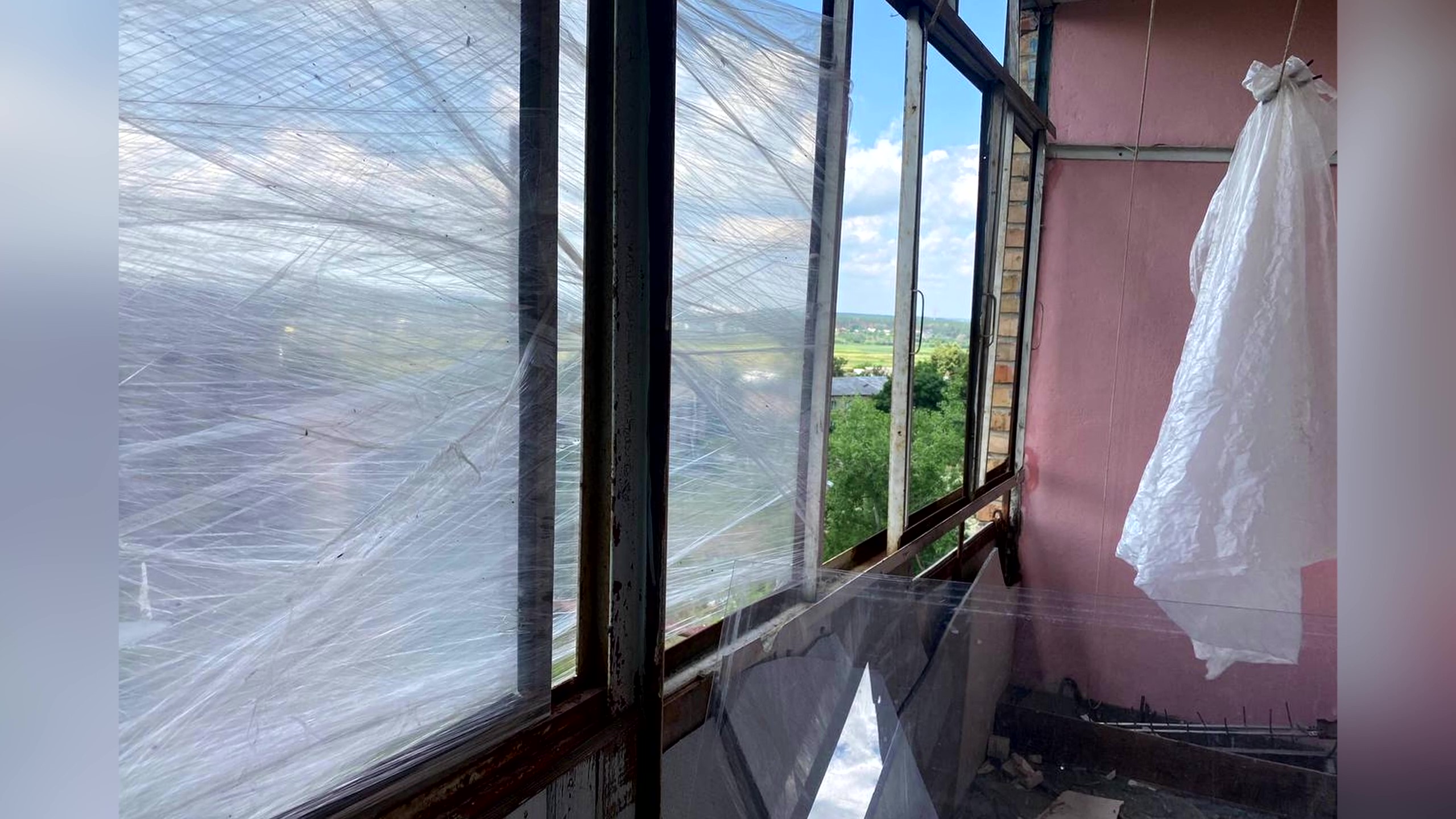
The way home
When did you return home?
I went to my parents in Kyiv, then my husband arrived two days later. And on April 5 we managed to go home — to Horenka — for the first time. It was very frightening. The rubble had not been cleared and everything was dark or grey. Now it is a bit easier because the trees are blossoming and nature has come back to life. So, you realise that life just goes on. You have to accept it somehow. But when we came back, everything was grey — dark colours, grey trees, those terrible sounds of silence. The wind howled in the buildings. It was frightening to walk past the house because when we left it was undamaged. We couldn’t believe it was our house on the pictures and videos until we arrived and saw it for ourselves. We climbed the stairs, followed the trampled paths and footprints, and watched where the dogs went because there had been no demining yet. And we followed the trail so that, God forbid, we would not be blown up somewhere. There still could be trip wires, so it was scary.
We entered our flat. There was some damage. The interior doors and windows were damaged, the radiators were broken. But compared to other flats, I can say that our flat was slightly damaged. A shelf above the kitchen table was broken. And the glass lid on the gas hob was broken. Everything else was okay. Broken windows and doors were a common story for any damaged building. The radiators were defrosted and just torn apart. There must have been a detonation as a result of the explosion. If you walk around the house, you will see that rockets hit our neighbourhood very often. My husband and I counted 18 hits from the other side of the house. And right here a bomb was dropped on the house.
At some point, your mind refuses to understand this terrible reality. You just feel lucky that at least the flat and all the belongings you have collected over a lifetime survived. At some point I gave up. I didn’t want anything; I didn’t realise the reality. I had everything and at the same time I had nothing.
Airstrike on civilians
Were there people in the house when the bomb hit?
When the bomb hit the house at 23:15 on March 7, there were eight people and three dogs in the basement. They cooked food and after that went down to the basement because the curfew started at 22:00 and it was safer to be in the basement. So, people went down and wanted to rest but at 23:15 the bomb hit the house. The house shook and people realised that they could not get out through the same entrance. They broke through the wall between the two basements to get out but there was only a locked bar. One of the residents broke through the wall and escaped through the alcove of pipes. Then they spent the whole day sawing the lock off the bar. It took people a day to get out.
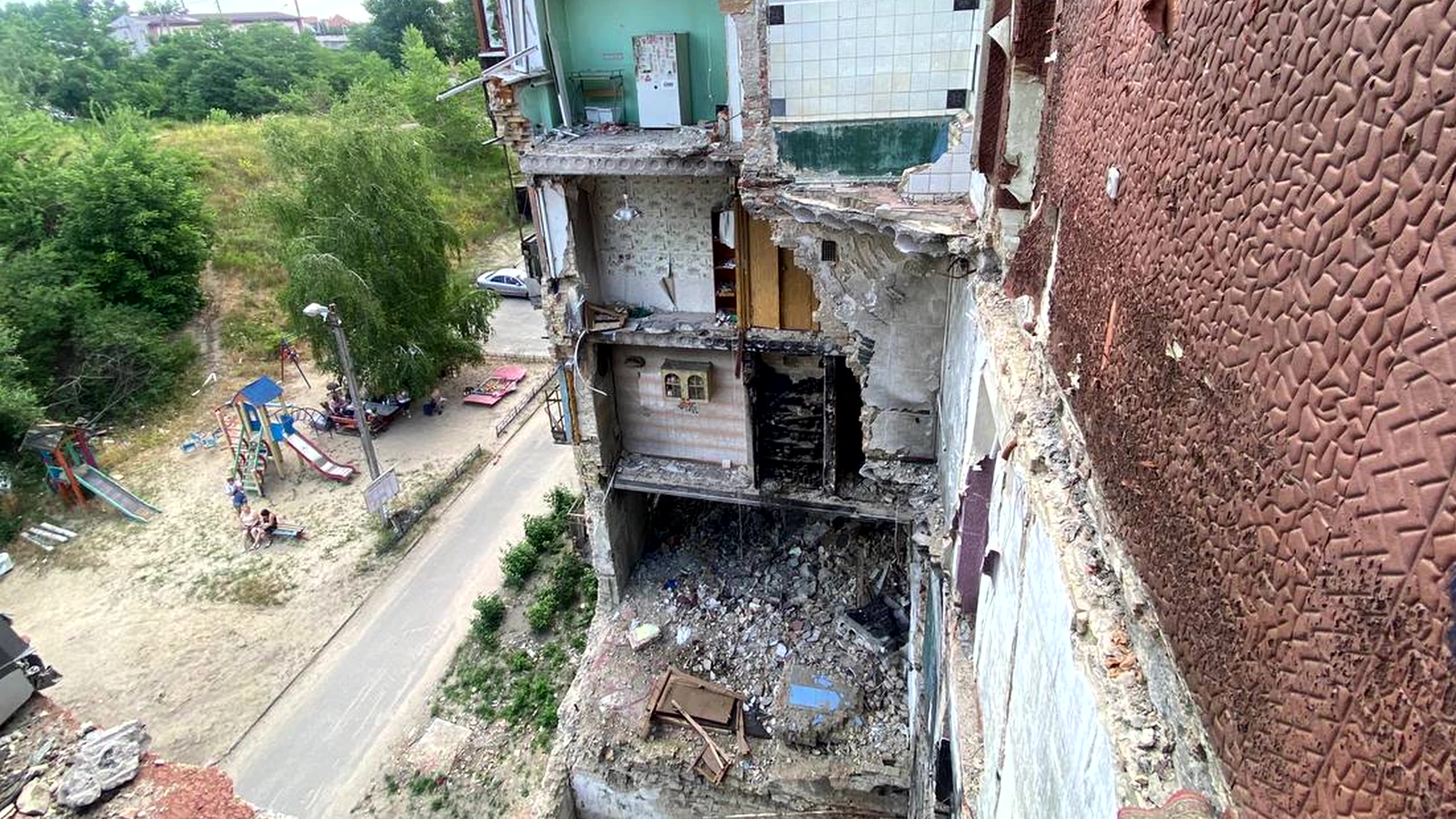
How to move on
What are your plans for the future?
We don’t know if our house will stand or not. Will it be rebuilt? We have decided with our neighbours to clean all the basements, as they are currently cluttered and not suitable for use as bomb shelters in case of new attacks. It is also unclear whether there will be electricity supply in the house or not. It is a problem because our houses get electricity from a substation that has now been destroyed, so we have no electricity. But there was information that the substation will be repaired, so there is a chance that we will have electricity supply. It is very important that the substation is repaired because a lot of houses nearby depend on it.
Attitude towards former friends
Has your attitude towards the Russians changed?
Of course! It has changed very much in a negative way after the consequences of Russian so-called “liberation”. We didn’t ask to be liberated! My father is a former military man, he is already retired. I went to school during Soviet times, I was also a pioneer. Because of my father’s military background, I attended a Russian-speaking school. And for the first five years of my education, I did not learn Ukrainian at all. Because we did not know where my father would be sent to serve. In those days he could be sent to any part of the Soviet Union. During the last two school years I studied only in Ukrainian. It was very difficult because I had to get used to Ukrainian language. I have been to many countries where we and the Russians were considered “brothers” (meaning former Soviet republics). We communicated, and even when Crimea was annexed in 2014, we called and talked to our Crimean friends. I had friends in Saky (a town in Crimea).
I went on holiday to Crimea with my child for ten years. Before 2014 and even after I communicated with my Crimean friends. After February 24, I tried to reach out to the Crimeans. I told them: “Understand what you are doing! Don‘t do this! We feel comfortable in our country. Yes, we want to join the European Union. Maybe somebody wants to, maybe somebody doesn‘t, but we don‘t need to be liberated by you (the Russians)! Don‘t bomb our cities and villages! Don‘t destroy our infrastructure!”
Why are they doing this?! Honestly, I still don‘t understand who they want to liberate us from. I no longer want to communicate with these people and I am not communicating with them now. Once I told them to go in the direction of the Russian warship and that‘s it (famous phrase said by the Ukrainian military to the Russians on a warship: “Russian warship, go f**k yourself”). Well, what else should I have said to them when they told me that it‘s my own fault, that I destroyed my own home. Who? Was it me? Or the Ukrainian army dropped a bomb on my house? I don‘t want to talk to these people. I can‘t have any relations with them... I think, this huge gap between us (Ukrainians and Russians) will remain for years or even generations.
Translation: International Society for Human Rights (German Section)
 The article was prepared by the Kharkiv Human Rights Protection Group with the support of the "
The article was prepared by the Kharkiv Human Rights Protection Group with the support of the "